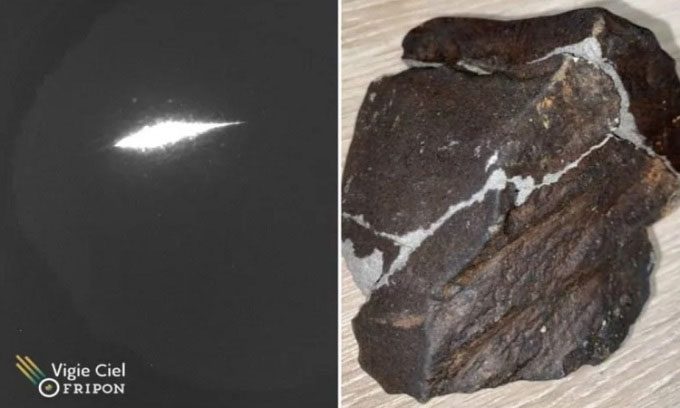A meteorite exploded in the night sky over central France and fell into the yard of a woman’s home.
The fireball, also known as a bolide, falling to Earth was spotted by hundreds of local residents across France on the night of September 9-10, according to the Fireball Recovery and Interplanetary Observation Network (FRIPON)/Vigie-Ciel, a citizen science project, as reported by Newsweek.

A piece of meteorite found in the garden of an anonymous woman. (Photo: Vigie-Ciel).
While FRIPON/Vigie-Ciel was in the process of estimating the landing site of the meteorite, a woman contacted them from the Communes of Sauldre and Sologne in central France. She reported that a meteorite had fallen into her garden. The woman was awakened by a loud noise at night and discovered several rocks in her garden the following morning.
The research team arrived at the scene to investigate and found three pieces of meteorite in the garden, each weighing about 0.7 kg. According to Sylvain Bouley, president of the French Astronomical Society (SAF), the outer layer of the rock melted while traveling through the atmosphere, but the inner part, containing sparkling grains revealing the presence of metal, was clearly visible. All the aforementioned characteristics belong to meteorites. The pieces of meteorite found in the woman’s garden were sent to the Natural History Museum in France for further analysis.
Meteorites are chunks of rock and ice that fall through the Earth’s atmosphere, heated to extreme temperatures as they plunge towards the ground at high speeds. Bouley estimates that the meteorite in France was moving at several hundred kilometers per hour upon impact with the Earth. “Fortunately, the homeowner was not injured. There was no crater, but the meteorite broke a table,” Bouley stated.
A meteorite appears as a bright fireball in the sky if it is larger than average, creating a flash of light. Most meteorites vaporize during their fall, with only about 4% of the original object reaching the ground, according to NASA.
“As it travels through the Earth’s atmosphere at high speeds (over 12 km/second), it pushes the air in front of it, causing the air to become superheated (similar to a shock wave), leading to the surface of the rock being ‘shaved off.’ Essentially, the surface layer overheats and vaporizes,” explained Jonti Horner, an astrophysics professor at the University of Southern Queensland, Australia. “The process pushes the rock farther until friction with the atmosphere reduces its speed to subsonic velocities.”
Meteorites falling are unlikely to cause fires in homes or gardens, despite the high temperatures they endure in the atmosphere.





















































